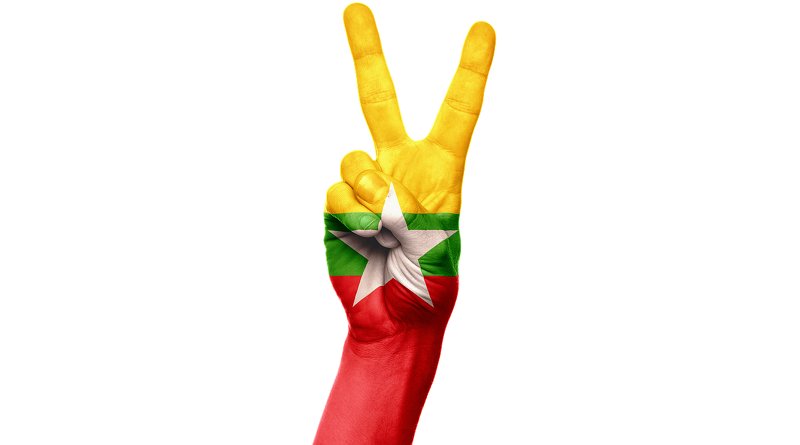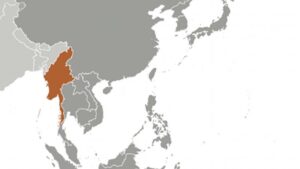A Delicate US Policy On Myanmar – OpEd
At the turn of the twentieth century, the United States reigned as a superpower after two world wars. But this came at the price of dealing with a constant litany of regional conflicts across the globe. The US foreign policy has been less than successful, if not failing, in Asia, Pacific Islands, Africa, Latin America and South America mainly because the US was seen as a dominant superpower instead of a friendly and generous trusted partner and in some instances, as an occupier rather than a liberator.
The story of relationship of US and Myanmar (a.k.a Burma) dated back to 1945. Myanmar, a country larger than Texas, occupies a strategic geopolitical position between the two world’s most populous countries, India and China. Yet, Myanmar has been largely ignored on the world stage and undervalued for economic and national security interest by US policy makers.
There is a misconception that the US has limited influence in shaping Myanmar’s future. It is true that Myanmar’s future must be shaped by Myanmar’s people. But the US can and must play a proactive role in leading the free world by standing decisively on the right side of the history with consistent principles of freedom and democracy, not a reactive role through repeated Cold War era-like policy or passive-aggressive policy side-stepping in the shadow of China.
At the end of World War II with the Cold War under way, US foreign policy focused on deterring international communist expansion across Asia, including Myanmar. The US was concerned that the first prime minister U NU’s democratically elected government, which was weakened by ethnic civil war, did not have the ability to stop the spread of communism. The US-Myanmar relationship was further complicated by remnant Nationalist Chinese (KMT) forces invading northern Myanmar, supported covertly by the CIA. The US changed course when the KMT was seen as a constant threat to security and disruptor of regional economy, a pretext for invasion by the PRC. The US was interested in providing economic and military aid to bolster ability of U Nu’s government to take on communist rebels, and to maintain its dependence from PRC.1
The year 1962 marked the end of democracy in Myanmar because of a power struggle between two major parties rather than the parties focusing on implementing the Pang Long Agreement with the ethnic groups. The historic agreement, signed by representatives from Shan, Kachin and Chin on February 12, 1947, accepted full autonomy in internal administration for the frontier areas. This vulnerability was used as an excuse for a military takeover, first as a caretaker government with a twisted constitution in 1958 and then a coup d’état in 1962 by Gen. Ne Win.
Ne Win’s dictatorship marked the beginning of a cold relationship with the US, attributed to his deep dislike of the US. The US accommodated to Ne Win due to his strict nonalignment policy at the peak of the Cold War. When the historic Sino-American diplomatic ties were established in 1979, the relationship with Myanmar also changed in coordination with antinarcotic operations.
The relationship faced an unexpected turn in 1988 when there was a nationwide political uprising due to economic mismanagement by Ne Win’s “Burmese Way to Socialism.” The strongman stepped down from the political stage, but he extended the stratocracy by staging another coup by his defense chief Gen. Saw Maung, who was purged in 1993 by his deputy, Gen Than Shwe. The military’s power grip was tightened until the generals were choked by tough sanctions imposed by the US and the West.
In 2008, a constitution was crafted and stated that 25% of parliamentary seats were to be appointed by commander in chief Gen. Min Aung Hlaing who was handpicked by Gen. Than Shwe, assuring continued control by the military. The new chief wielded absolute power to appoint 6 out of 11 members of the National Defense and Security Council, which was formed in 2011. A quasi-civilian government, elected in 2010 and led by former general Thein Sein, initiated political and economic reforms in 2011. The US and allies lifted economic sanctions and re-established a close relation, including the first visit to Myanmar by a U.S. president.
The relationship was further solidified when the National League for Democracy led by Aung San Suu Kyi won the election in 2015. Despite fundamental steps taken towards a democratic transition, there was an increase of military violence, leading to horrific atrocities against the Rohingya ethnic group in Rakhine state in 2016-2017. The US imposed sanctions against Gen. Min Aung Hlaing and Gen. Soe Win in 2019.
On February 1, 2021, Gen. Min Aung Hlaing attempted a coup d’état falsely claiming voter fraud. The coup was met with strong resistance from civilians of Myanmar by widespread, peaceful demonstrations and the Civil Disobedient Movement. The US led international efforts to press the military to reverse the coup and refrain from violence, but the junta responded with further brutal crackdowns, culminating into armed resistance, known as the Spring Revolution. It was led by the National Unity Government (NUG) and Ethnic Resistance Organizations (EROs).
The US refused to recognize the junta-led State Administration Council (SAC) and imposed cautiously stepwise targeted sanctions under EO14014 starting on February 10, 2021. The sanctions would have been more effective if applied cohesively over companies, such as Myanmar Foreign Trade Bank (MFTB), Myanma Investment and Commercial Bank (MICB), Myanma Oil and Gas Enterprise (MOGE), and if imposed along with Myanma Economic Holdings Limited (MEHL) and Myanmar Economic Corporation (MEC) earlier immediately following the coup.2,3
The USG established a relationship with the NUG but fell short of formally recognizing it. US policy was delegated to an irrelevant and ineffective Association of Southeast Asian Nations (ASEAN) while observing the NUG for its capacity to govern and ability to build unity with EROs to form a democratic federal union.
Since 2012, US has provided $1.2 billion to support Myanmar’s democratic transition and economic transformation. In 2023, the US Congress appropriated $130 million in the Consolidated Appropriation Act to fund the Burma Act of the 2023 NDAA. USAID/BHA delivered $79.9 M for regional crisis and $17.3 M for Cyclone, and State/PRM delivered $14.4 million for regional crisis in 2023.4,7 The delivery of the aid was through the organizations of United Nations and was weaponized by the junta. The cross-border assistance was further jeopardized by pro-junta Thai government. For 2024, the Senate appropriated $121 million for the State Department to use under the Burma Act while the House version of the bill appropriated only $50 million.5,6
The crisis in Myanmar has plunged into a failed state with protracted armed conflicts between freedom forces with limited financial resources and deeply pocketed junta lacking people’s support. The civilian casualties are escalating as the military (Sit-Tat) has unleashed air raids and indiscriminate massacres. The junta is facing unprecedented military setbacks on the ground, but the civil war is dragging on as the military has been able to procure advanced weapons thanks to Russia and China’s gratuitous policies as well as ineffective embargo for arms and aviation fuel.
Myanmar shares a 1300-mile border with China, and the emergence of the giant’s global economic power and massive military buildup has furthered popular opinion that the US’s influence is limited by PRC.8 The troubled history of Myanmar will not end unless the military dictatorship is eliminated, and a federal union formed under the constitution drawn by all ethnic groups with equal rights and opportunity as well as a democratically elected civilian government is restored. This end game will not be achieved without continued mounting casualties and further destruction of the nation unless the resistance forces are decisively supported by the US and the West, starting with full recognition of NUG and substantial support for nonlethal assistance for governance and humanitarian aid.
According to Amb. Scot Marciel, “The U.S. government, myself included, no doubt made a lot of mistakes on Myanmar policy, but the driving force at least since 1988 has been democracy and human rights.” It may be true this global platform of US foreign policy would make Beijing uneasy. However, the U.S, strategy on Myanmar should not be about Tit-for-Tat on China, but it should be about genuinely being a reliable, trusted, and good partner. Both Beijing and Washington have common goals of counter measures on narcotic production and trafficking, cyber-scams, money laundering, and regional stability in Southeast Asia.
As urged by Amb. Marciel, Washington should support the freedom forces more proactively and comprehensively while making clear to PRC that US would welcome good relations between any future civilian government in Naypyidaw and Beijing. A transparent policy and visible actions including the implementation of the Burma Act should alleviate the anxiety of Beijing. The duo can coordinate regarding contingency plans in SSR and DDR of the Sit-Tat and restoration of the war-torn nation. It is overdue that the U.S., takes the leading role in humanitarian assistance with innovative means since the cross-the-border strategy has failed. Washington must walk the talk to earn the trust of the Myanmar people and other potential global friends pursuing liberty and happiness.
References
- https://www.jstor.org/stable/10.7591/j.ctt1h4mhd4
- https://home.treasury.gov/news/press-releases/jy1555
- https://www.state.gov/sanctions-against-the-myanma-oil-and-gas-enterprise-and-concerted-pressure-with-partners/
- https://www.usaid.gov/sites/default/files/2023-07/2023-07-19_USG_Burma_and_Bangladesh_Regional_Crisis_Fact_Sheet_5.pdf
- https://www.congress.gov/bill/118th-congress/house-bill/4665
- https://www.congress.gov/bill/118th-congress/senate-bill/2438
- https://www.congress.gov/bill/117th-congress/house-bill/5497/text?q=%7B%22search%22%3A%5B%22hr5497%22%2C%22hr5497%22%5D%7D&r=1&s=2
- https://www.washingtonpost.com/opinions/2023/12/06/support-myanmar-elected-government/



A fantastic article for me to share with my uninformed friends and family members explaining the complex situation in Myanmar and its quest towards democracy. My wife is from Burma-Myanmar and her family are thriving in America after leaving the oppressive military government. The path for Myanmar unchained by its military rule would help all its people instead of the few…
Thank you for your support. As a champion of democracy and freedom, US should come out of wait and see policy of reluctance. Effective substantial nonlethal support on freedom forces by US should not make PRC anxious. A democratic Myanmar civilian government is as reliable as Thai (??) government for national security and stronger economic ventures. Why not having 2 reliable friends instead of 1 by Andaman Sea?